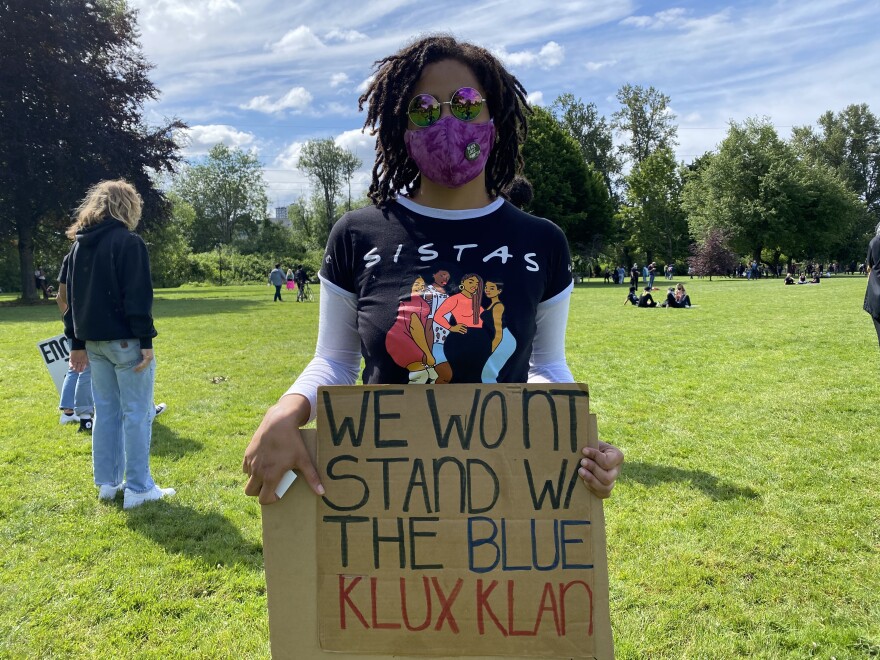On Sunday, at least 7,000 people rallied in Eugene to protest the killing ofGeorge Floyd while in the custody of Minneapolis police officers. The protest also comes after other incidents that have gained national attention—including the death ofAhmaud Arbery andBreonna Taylor, as well as a confrontation videotaped byChristian Cooper.
But many black protesters in Eugene were also there in honor of their own experiences with racism.
18-year-old Kassidy Hampton has lived in Eugene for about four years. She said it has been difficult to live in a town that is less than 2% black.

“It's not always easy knowing that I'm always going to be the minority in the Pacific Northwest region,” said Hampton. “Knowing that I always have to fight for my rights and knowing that I always have to fight for equality, and working hard to be treated the same as any other person who lives here or if I move anywhere else.”
While part of a step group with Sheldon High School, she said the group was called derogatory names during one of their performances.
“After that I have seen our community differently. Knowing that growing up and living my life, it is not going to change soon,” said Hampton. “But hopefully as I continue to do stuff like this, that people will be aware and hear our voices and listen to our needs.”
20-year-old Orion-John has lived in Eugene for about eight months. Adopted from Sierra Leone in Western Africa, he has lived in Newport, Oregon ever since. But he said he’s experienced racism from others while walking around with his own mother.

“My mom was white,” said Orion-John. “So being with her, I get accused of, ‘Oh, are you okay, ma'am?’ Like what? This is my mom. Things need to change. Things need to change immediately.”
He said he tries to build a community with other black people so they are more familiar with one another. But it is not always easy.
“A lot of black people are afraid of other black people, unfortunately,” said Orion-John. “Or they're afraid to speak out because it is such a predominantly white state. It's a struggle but also—it's just a struggle to be honest.”
Orion-John said he almost did not go to Sunday’s protest. He had attended the protest on Friday in Eugene, and said he was scared after watching rioters set fires and vandalize businesses on Friday—which according to videos—was mostly done by white people.
“I was kind of scared because you don't really know how white people act when they're, in a way, given freedom,” said Orion-John. “Because [the rioters], they were just going crazy. And if you saw a lot of the videos, a lot of my fellow brothers and sisters were trying to stop and say like, ‘Stop ruining these businesses because that's not what we're here for.’”

55-year-old Heather Miller, who is both African American and Native American, has lived in Oregon since 1993. The Salem resident happened to be in Eugene for work when the protests began. She said she has not experienced a lot of racism while living here. But she did remember a time where she felt racially profiled in 2005 while shopping in a Ross store in Portland.
“I was browsing in the store and a police officer began to follow me around,” said Miller. “I was looking at him and I kept moving and then he kept following him. So then as I left and went out the door, he said, ‘Let me check your pockets. Let me see what you got.’ I complied, but I'm thinking of what would have happened if I hadn't complied. Would he have wrestled me down?”
Miller said she even has family members who were former police officers. So for many reasons, Miller said she is not anti-police. She even recalled an experience she had with a police officer while she was a Service Coordinator for Cascadia Behavioral Healthcare.
“I remember coming home from work cause I used to work swing shifts in Hillsborough, Oregon,” said Miller. “A nice police officer saw that I was waiting for the bus at one o'clock in the morning and offered to give me a ride home. So I've had good experiences. But that one experience kind of put me in check.”

As violence continues locally and across the nation, a lot of rioters who have been videotaped have been white. But Hampton is asking everyone to stop committing acts of violence.
“There is no reason to riot,” said Hampton. “I think if we just protest peacefully and if you want to be an ally to black lives, then you will do what we're doing. Which is we're just protesting peacefully and we're asking for you to listen to us. Just not breaking into stores and stealing stuff is not gonna do us any good because they’re going to blame it on us, not what you're doing.”






